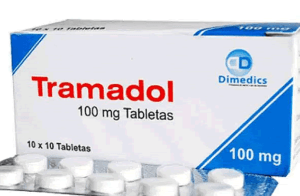UN agency sees Tramadol abuse as emerging public health threat in West and North Africa
 Ghana has in recent times seen an upsurge in the importation and use of tramadol. Tramadol is a man-made (synthetic) narcotic analgesic (pain reliever) that is usually prescribed to patients suffering from moderate to severe pain.
Ghana has in recent times seen an upsurge in the importation and use of tramadol. Tramadol is a man-made (synthetic) narcotic analgesic (pain reliever) that is usually prescribed to patients suffering from moderate to severe pain.
Studies have shown that in Ghana, the drug is also indiscriminately used among market women, drivers, and in some cases, students for its psychotic effects and also for recreational purposes.
Medical experts say overdose of Tramadol has dire side effects including: agitation, headache, dizziness, drowsiness, tired feeling, constipation, diarrhoea, nausea and vomiting many of which can be dangerous and may affect the brain in ways very similar to illegal drugs. Other side effects include hallucinations, itching, sweating, flushing and fever, fainting, seizure (convulsions) infertility, impotence, sexual problems, organ damage and subsequently death in severe cases.
Tramadol, according to the Foods and Drug Board (FDA) is classified as a Prescription Only Medicine (POM) with approved dosage of 50mg and 100mg. However, the Foods and Drugs Board, says some sections of the public are using tramadol unapproved dosage strengths of about 120mg, 200mg and 225mg.
However, Ghana may not be the only country faced with this alarming phenomenon which poses a lot of public health challenges. The phenomenon is widely reported in many parts of West and North Africa according to the new UN Drug report.
The 2018 edition of the Drug report released by the United Nation Office on Drug and Crime (UNODC) reports that the non-medical use of pharmaceutical opioids such as Tramadol is of increasing concern for both law enforcement authorities and public health professionals globally. As per the findings of the report, different pharmaceutical opioids are misused in different regions of the world. In West and North Africa and the Near and Middle East, the UNODC reports that illicitly sourced and non-medical use of tramadol, a pharmaceutical opioid that is not under international control, is emerging as a substance of concern.
On trafficking, the report says non-medical use of and trafficking in Tramadol are becoming the main drug threat in parts of Africa. The report went further to say that, the focus for global seizures of pharmaceutical opioids is now firmly on countries in West and Central Africa and North Africa, which accounted for 87 per cent of the global total in 2016.
“Countries in Asia, which had previously accounted for more than half of global seizures, reported just 7 per cent of the global total in 2016,” the report added.
The general rise in seizures of pharmaceutical opioids (Tramadol inclusive) in Africa is mostly attributed to the worldwide popularity of Tramadol, an opioid used to treat moderate and moderate-to-severe pain that is widely trafficked for non-medical use in the region.
While some Tramadol is diverted from licit channels, the report records that most of the Tramadol seized worldwide in the period 2012-2016 appears to have originated from some clandestine laboratories in Asia.
The drug is not yet under international control and is perceived by recreational users as a way of boosting energy and improving mood and mostly used by the some vulnerable populations, the report noted.
By Bismark Elorm Addo
Copyright ©2018 by Creative Imaginations Publicity
All rights reserved. This news item, or any portion thereof may not be reproduced or used in any manner whatsoever without the express written permission of the publisher except for the use of brief quotations in reviews.
